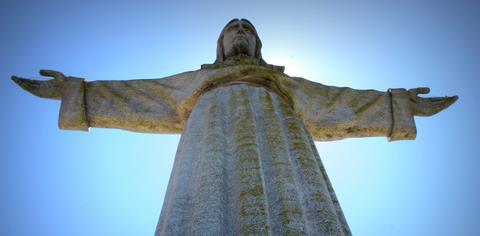According to a new Ofsted report, sexual harassment has become ‘normalised’ in some schools, with 9 in 10 girls reporting sexist name-calling or being sent explicit photos or videos. Alun Ebenezer is the executive headmaster of the Fulham Boys School. He believes the answer to our modern crisis of masculinity can be found in beholding Jesus, the ultimate example of what it means to be a man

Right now it is open season on manhood. At our worst we are power hungry, aggressive and self-entitled. We demean and abuse women, we are bad role models for our children and we are addicted to screens and pornography.
Behaviours that have made the streets unsafe after dark have developed rape cultures in some of our ‘top’ schools; and led to widespread sexual misconduct, so much so, that when women tell their stories of harassment, many other women have said #metoo.
It would seem masculinity is toxic and the time has come to make root and branch changes to how ‘boys will be boys’.
So what should a man be like? A woman? Is that the answer? Feminise boys? Many teachers over the years have said to boys, “why can’t you be more like the girls”.
Everyone’s invited to have their say on this and no doubt different groups will use social media to push their agendas forward. But at such a watershed moment in the reconstruction of twenty-first century man, here’s an idea… Why not do what Pontius Pilate told the first century crowd in Jerusalem to do and ‘behold the man’?
Why don’t we take the time to put our prejudices, biases, political correctness and second-hand hearsay aside and do some ‘fact checking’ on the man the sixteenth century reformer, Martin Luther, called the ‘proper man’? And not judge or dismiss him on the conduct of his followers, but behold him.
The man was Jesus of Nazareth, no superman but a real man. He looked like a man, indistinguishable from other Middle Eastern men. He developed like any other normal child; learned to speak, read and write and went to school. He bled, got tired, lonely, thirsty, hungry, wept, laughed, loved, needed company, was troubled, suffered and died.
He was lower working class, the oldest of at least eight children and was brought up in a small backwater village; a place infamous for its roughness, wildness and wickedness. In tight, cramped conditions, where families have misunderstandings and where tempers fray, he lived in a home made of mud and branches, consisting of one large room, with a goat, cow or donkey at one end, and a raised platform where the family slept on mats at the other.
Growing up, he played on the streets of Nazareth with the other children, spoke with a heavy northern accent, learned a trade from his supposed father who was a carpenter, and spent most of his working life doing building and repair work. He must have been strong and healthy and had a lot of energy and resilience, enabling him later on in life to travel on foot for long journeys, preach for hours and endure the sufferings and agonies of his final night and day. He didn’t idolise his body but looked after it.
He got angry and spoke out against wrongdoing, but was never harsh or cruel. He was unselfish; never responded to provocation nor engaged in self-justification or in getting his own back. He always did the right thing, not the easiest. He couldn’t be bought or schmoozed and chose the company of fishermen, outcasts and the disreputable rather than the supposed ‘good and the great’.
He was kind and full of compassion. As he hung on the cross in agony, he thought about his mother and made practical arrangements so that she would be looked after. Despite being busy and tired, when he saw crowds of people he felt sorry for them, listened to their problems, gave them time and attention and dealt with them tenderly.
Children warmed to him and wanted to be with him, and in stark contrast to the thinking of his day, he had a high regard for women. He relied on their help and support and assigned them a place of high honour. In a culture where women were not trusted to give testimony in a court of law, it was women who were by his cross at the end of his life and the first witnesses of his resurrection. No one has done more for the dignity of women than this man.
To show his disciples what greatness looked like, he put on a slave’s apron, poured water into a basin and went around them one by one washing their feet; feet that had walked in sandals along dirty, dusty roads.
He knew and faced all the temptations of working men, but without sin. According to those closest to him he never did anything wrong. His enemies also concluded, ”we find no fault in him.” Even the one who handed him over to his enemies and knew him as well as anyone, later confessed, ”I have betrayed innocent blood.”
Just imagine if all men were like this man and followed his example?
He respected his parents and had a sense of duty to his family. The reason he delayed his entry into public life was possibly because his father died when he was young and, as the oldest in the family, he took over his father’s responsibilities until the next brother was sufficiently mature to take over.
He stands as a peerless teacher of the ages and taught with authority. Those who heard him said, “Never man spake like this man.” He never paraded his learning but used a unique combination of simplicity and profundity so that, ”the common people heard him gladly.”
Just imagine if all men were like this man and followed his example? Streets would be safe, children could feel secure, families would be happy, leaders would be servant hearted, the most vulnerable would be helped, and everyone would be respected and valued, irrespective of sex, race or class.
But this man didn’t come to the world to be just an example. He came to actually sort out the mess men have made. Into a broken, unforgiving world, where people judge each other by standards they cannot keep themselves, the only man in the position to stand in judgement, came not to judge but to save. And he did it by being stripped, tied up, beaten, punched, spat on, whipped and laughed at before finally being nailed to a Roman cross on a rubbish tip outside the city wall of Jerusalem where he took the punishment for, and dealt with, all the mess, guilt, shame, hurt, filth, anger and sin of the world.
Providing forgiveness for the man we have been. An example of the man we should be. And help to become that man.
At such a time as this, surely the country should at least ‘behold the man’. Could it be that the state we are in is because we haven’t?

































